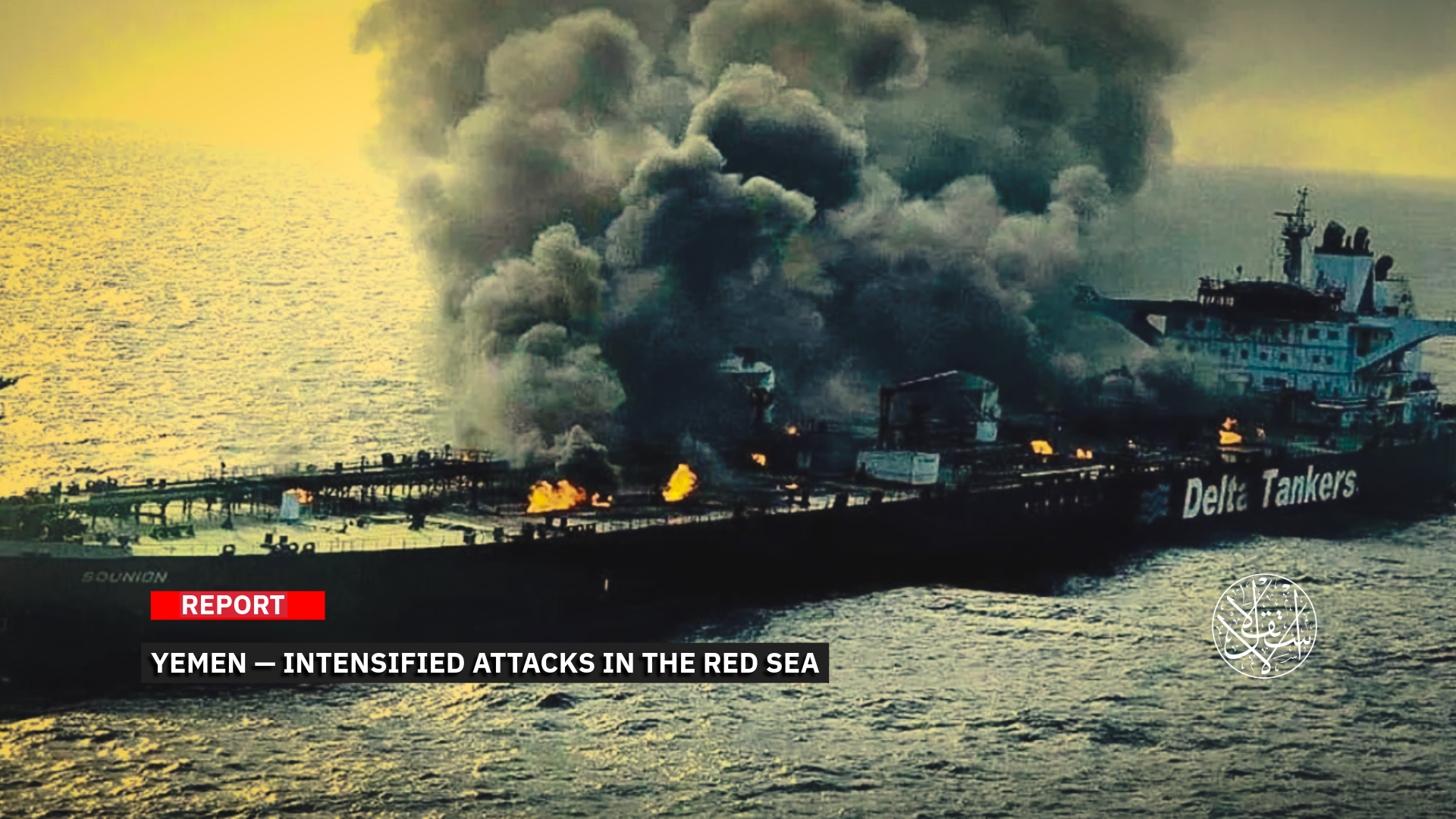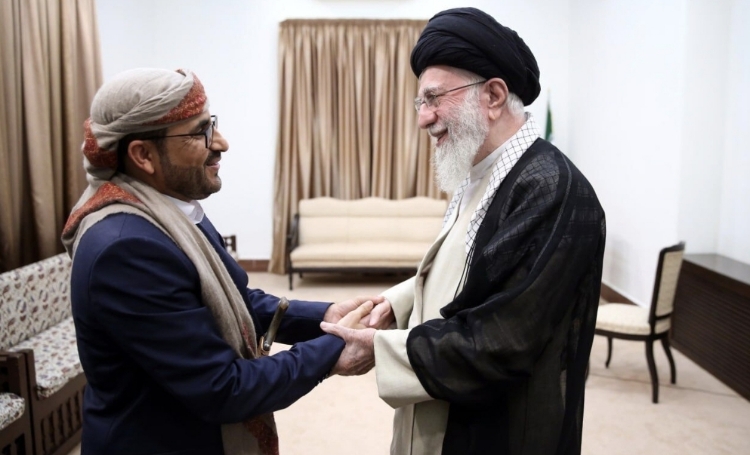Why Are the Houthis Stepping Up Attacks on Israeli-Linked Ships Now?

Washington believes the Houthis are still committed to the ceasefire.
After the Houthis restarted attacks in the Red Sea in support of Gaza following a months-long break, many have questioned why now and if the U.S. could restart its “military strikes” in Yemen, which have been paused since May 2025.
In just two days—July 7 and 8, 2025—the Houthis targeted and sank two Greek cargo ships, Eternity C and Magic Seas, accusing them of heading to Israeli Occupation ports.
Accusations Toward Iran
The U.S. denounced the attacks as “acts of terrorism” without justification, seeing them as clear evidence that Iran-backed Houthis remain a serious threat to security and commerce in the region’s waters.
U.S. Ambassador to the UN Dorothy Shea said Washington is committed to cutting off the Houthis’ funding sources, urging the Security Council to resolve obstacles facing the UN Panel of Experts on Yemen.
In a statement on July 10, Shea also accused Tehran of ongoing coordination with the Houthis, stating that the recent Red Sea attacks and their alignment with Iran in targeting “Israel” underscore the need for continued vigilance by the Security Council.
In a statement on July 8, the U.S. State Department described the Houthi attacks as a persistent threat to regional maritime freedom, economic stability, and security, blaming “Iran-backed rebels” for undermining navigation in the Red Sea.
The statement emphasized that the U.S. will continue taking necessary steps to protect freedom of navigation and commercial shipping from what it called “Houthi terrorist attacks,” urging the international community to collectively condemn them.
Meanwhile, German Foreign Minister Johann Wadephul suggested that Iran bears responsibility for the Houthis’ actions, saying Tehran should use its influence to stop the group from attacking ships in the Red Sea.
Speaking during a press conference in Vienna alongside his Israeli and Austrian counterparts, Wadephul stressed the need for broader dialogue with Iran—not only on its nuclear program, but also its regional behavior.
The British Embassy in Yemen also condemned the attacks in a statement on July 13, calling the targeting of civilian ships and disruption of maritime freedom a violation of international law. It warned that continued assaults risk obstructing trade flows and undermining prospects for sustainable peace, urging the Houthis to immediately halt their attacks.
These are the first attacks since U.S. President Donald Trump announced on May 6, 2025, that military strikes on Yemen would stop following what he described as the Houthis’ “surrender” and halt of Red Sea assaults. At the time, he confidently stated, “They say they will not be blowing up ships anymore.”
However, Mohammed al-Houthi, head of the Houthis’ Supreme Revolutionary Committee, stated on X on May 8 that “Yemen’s operations have always been in support of Gaza to stop the aggression,” stressing that the ceasefire with the United States does not include halting the group’s attacks on the Israeli Occupation.

Iranian Role
Regarding the timing of the Houthis’ renewed attacks, Yemeni writer and political analyst Yassin al-Tamimi believes they are “more linked to Tehran than any other regional actor,” noting that the nature of these attacks differs from previous ones, where the Houthis used to launch missiles that either hit or missed.
“The first wave of Houthi attacks on ships lasted a full year and targeted two vessels, but this time the attacks include explosive boats near the city of Hodeidah, which greatly limits maneuvering space and increases the direct impact,” al-Tamimi told Al-Estiklal.
“These attacks show increasing boldness in targeting ships and their crews, reflecting a coordinated effort by the Houthis and Iran to escalate tensions and raise the stakes in the Red Sea.”
Al-Tamimi believes that “Iran aims to strengthen its bargaining position on the nuclear file through the Houthi attacks; the Houthis had previously stopped attacking ships but have now resumed, which I see as a clear Iranian timing.”
“The method of attack is more advanced and risky than before, aiming to cause significant damage to international navigation and deliver a shock, which immediately raises insurance costs to an extreme level.”
Accordingly, al-Tamimi thinks “this increase in insurance will lead either to negotiations with the Houthis and Iran or to planning attacks with unpredictable timing, scale, and impact.”
“Some attempted to portray the May 6 ceasefire as an official deal between Washington and the Houthis, but in truth, the Houthis simply sought to pause their attacks and prevent further U.S. strikes, with Oman acting as a mediator.”
“This was a convenient excuse for Trump to announce to the world that the Houthis surrendered and he stopped the strikes, but it wasn’t a formal deal, which is why the Houthis resumed attacks now,” the political analyst added.
On the possibility of the U.S. resuming strikes against the Houthis, al-Tamimi said: “It largely depends on how much Israel can pressure the U.S. to restart attacks on Houthi sites and weapons, which could be either significant or nonexistent.”
“The Houthi strikes now serve as a pressure card in Iran’s favor, which stands to benefit from them. Meanwhile, the logic of Western powers is weak—especially if these ships were indeed headed to Israel, as that would make them military targets under the rules of engagement. The West cannot speak of aggression while ignoring the genocide in Gaza.”

‘America Will Not Respond’
Regarding whether Washington will react to the Houthis’ renewed attacks, the Wall Street Journal quoted a senior U.S. official (unnamed) saying that “as long as the Houthis aren’t shooting at American ships, the U.S. considers the cease-fire still in place.”
The official noted on July 10 that international efforts to protect maritime routes have weakened recently, with fewer naval forces able to counter the Houthis’ increasingly advanced arsenal.
“This is the worst damage they inflicted in the space of 48 hours,” Ellie Shafik, head of maritime intelligence at British digital solutions company Vanguard Tech, told the Wall Street Journal. “This is the worst in terms of successful, concentrated attacks.”
The Houthis sank two cargo ships in the Red Sea (Eternity C and Magic Seas) in the first escalation in seven months, Reuters reported on July 10.
The attack on Eternity C killed four sailors; 10 were rescued, and 11 remain missing. The entire crew of Magic Seas was evacuated to Djibouti by a passing commercial ship.
Since November 2023, the Houthis have targeted more than 100 merchant ships travelling through the Red Sea, sinking four vessels, seizing another and killing at least eight sailors, the report said.
On August 21, 2024, the Greek-registered oil tanker Sounion, carrying 150,000 tons of crude oil, was hit by multiple missiles and drones, catching fire. It took months before the ship was declared safe and the cargo removed.
Earlier, in June 2024, the Greek coal carrier Tutor sank days after being struck by missiles and a remote-controlled explosive boat near Yemen’s Hodeidah port. No crew members believed to be in the engine room were ever found, while others were evacuated and returned home.
In March 2024, a Houthi missile attack killed three sailors aboard the Greek-flagged ship True Confidence (registered in Barbados), marking the first known fatalities from these attacks.
Multiple missiles hit the British-owned ship Rubymar in February 2024 and became the first ship sunk by the Houthis when it went down on March 2.
In January 2024, the Greek ship Zografia, traveling from Vietnam to “Israel” with 24 crew members, was attacked near Yemen’s Salif port.
The first ship attacked by the Houthis was the Polish-flagged Galaxy Leader, flying the Bahamas flag, whose 25 crew members were held in international waters from November 2023 until their release in January 2025—over a year after being detained.
Sources
- Condemnation of the Recent Houthi Attacks on the Ships "Magic Seas" and "Eternity C" [Arabic]
- Faint Reactions to Deadly Houthi Escalation and Rising Insurance Costs [Arabic]
- ’They Say They Will Not Be Blowing Up Ships’: Trump Truce Falls Flat
- Trump Declares Victory and Abandons Allies: Houthi Surrender or U.S. Withdrawal? [Arabic]
- Key Houthi Attacks and the Number of Commercial Ships Sunk in the Red Sea [Arabic]
- Britain Reports 4 Crew Members Killed in Two Ships Attacked by the Houthis [Arabic]








